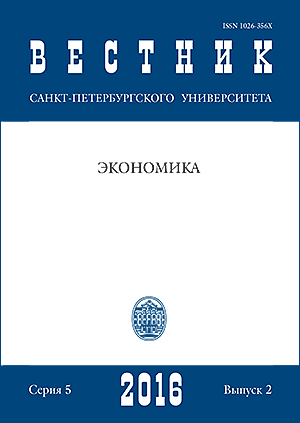Keynes’ Economic Theory and the Politics: Possibilities and Limitations in the Present Stage
DOI:
https://doi.org/10.21638/11701/spbu05.2016.201Abstract
The book by J. М. Keynes “The General Theory of Employment, Interest and Money” was published in 1936. Eighty years that have passed since then did not in any way diminish the importance and relevance of the work. As to assessment thereof, there still remain some contrary opinions. Th is article is dedicated to the research of basic theoretical postulates and practical recommendations given by the Keynesian Scientific School. The potentials and limitations of applying them to the contemporary realia are uncovered. Among such limitations should be noted current deindustrialization and growing indebtedness of the major economic subjects in the developed capitalist countries, which tend to reduce the effi ciency of the stimulating function of aggregate demand promotion.
The conclusion that creation of conditions for the effective implementation of the policies stimulate the aggregate demand determines the need for comprehensive reforming of the currently-existing credit-debt model of fi nancial capitalism, has been substantiated. For this purpose, the program of fi nance socialization designed to signifi cantly limit the scope of speculative fi nancial activities, has been put forward. Implementation thereof is viewed not only as a way of establishing a reliable monitoring and regulation of fi nancial intermediation by the state, but also as a precondition for the transition to a new mixed-type economy model.
The article has acknowledged the possibility to apply the demand promotion policy in Russia. Its successful realization is determined by advancing reformation of the financial sector, which is necessary for the activation of industrial policy, with focus on the innovative neo-industrialization. Th is is the way to ensure the dynamic and sustainable economic growth. Refs 28. Tables 5.
Keywords:
Keynesian economics, global crisis, economy of demand, supply-side economics, debt, demand promotion potential, economic reforming
Downloads
References
References in Latin Alphabet
Translation of references in Russian into English
Summers L. Reflections on the ‘New Secular Stagnation Hypothesis’. In Secular Stagnation: Facts, Causes, and Cures. Eds C. Teulings, R. Baldwin. London, CEPR Press, 2014, pp. 27–40.
Downloads
Published
How to Cite
Issue
Section
License
Articles of the St Petersburg University Journal of Economic Studies are open access distributed under the terms of the License Agreement with Saint Petersburg State University, which permits to the authors unrestricted distribution and self-archiving free of charge.






